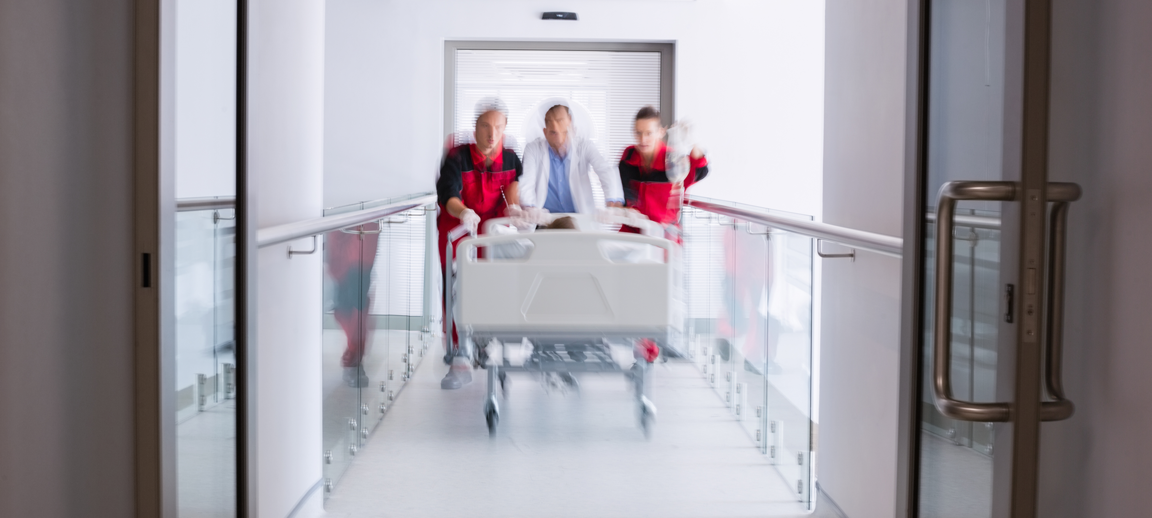Sepsis Recovery & Post Sepsis Syndrome
Many sepsis survivors can find their recovery challenging after they leave hospital and experience new limitations – UKST is here to support you.
Your sepsis experience may continue to affect you physically and emotionally when you return home. Regardless of your age, prior health, or activity level, recovery can take time. You have been through a serious illness, and it’s important to give yourself the time and support needed to heal.
Around 40% of people who develop sepsis are estimated to experience physical, cognitive, and/or psychological after effects. For most people, these effects will last a few months, but others can face a long road to recovery and develop Post Sepsis Syndrome (PSS).
You can find key information about sepsis recovery, what PSS is and how it affects people on this page, as well as information for those that needed a critical care admission and answers to some frequently asked questions.
If you are struggling with your recovery, or simply want more information about what to expect, you can contact our Support Nurses below.

We’re here for you
Call our Nurse-led helpline: 0808 800 0029
Usual working hours 9am – 4pm Monday to Friday (excluding Bank Holidays)
Or click here to schedule a callback
Request email support by completing this form.
We aim to reply within 48 hours
We have dedicated Facebook groups moderated by our Support Nurses. Click here to join our recovery group.
Common challenges after sepsis
Many people will find recovering from sepsis difficult and can have various symptoms develop in the weeks or months after they leave hospital.
- Recovery time varies for each person. Generally, it can take a few weeks to a few months, but for some it can take longer.
- There are contributing factors than can influence recovery such as age, medical history, length of hospital stay and whether or not an admission to Critical Care was required. See section ‘Sepsis and Critical Care’ for further information.
- For those people who have suffered significant organ damage, recovery can take time and be complex, often involving ongoing treatment requiring input from multiple specialists. If you’ve suffered organ damage and/or had an amputation, further specific information should be provided to you by your healthcare providers. Do ask them for this if it isn’t forthcoming.
Common symptoms people can experience after fall into three categories: physical, psychological, and cognitive. The following lists are not exhaustive. Some people have one or two of the problems listed, some may have more.

PHYSICAL
- Fatigue
- Repeated infections
- Trouble sleeping
- New allergies and sensitivities
- Itchy and dry skin
- Brittle hair and hair loss
- Brittle nails and teeth
- Intolerance of very bright, noisy or crowded spaces
- Temperature sensitivities, often feeling very cold or sweaty
- Joint pains and muscle weakness
- Dizziness
- Headaches
- Nausea
- Breathlessness
- Poor appetite
- Change in taste
- Change in vision
- Reduced kidney function
COGNITIVE
- Difficulty with short term memory
- Difficulty with concentration
- Problems with speech, for example finding the right words
- Ability to perform tasks you previously found easy
PSYCHOLOGICAL
- Low mood, mood swings – feeling snappy, irritable, angry or upset
- Lack of interest in things that you previously enjoyed doing and possibly in your personal appearance
- Anxiety about becoming unwell again
- Loss of confidence
- Wondering “what if I hadn’t survived?”
- Feeling guilty for the worry everyone experienced, or that you survived
- Remembering some or all parts of your hospital stay, with these thoughts recurring as dreams, nightmares, or “flashbacks”
- Feeling frustrated, isolated or that nobody understands how you may be feeling
- Strain on your relationships
Post Sepsis Syndrome
Some people may find their recovery from sepsis is longer and more problematic than expected and can encounter all or a variety of the symptoms listed above.
Post Sepsis Syndrome (PSS) describes a variable set of ongoing issues that people encounter for a prolonged period of time following sepsis.
Not everyone who gets sepsis will get PSS, but it can impact anyone regardless of their age or their health before they became ill.

recovery FAQs
Why do I feel the way I do?
Sepsis can cause widespread inflammation and changes in blood flow in the smallest of our blood vessels. This can affect the function of organs and body tissues in different parts of our body. Other problems faced can be due to:
- A prolonged hospital stay resulting in periods of immobility
- Some medications used whilst in hospital including sedatives
- Delirium, which is common during critical illness
- Loss of appetite or malnourishment
- The psychological trauma of being in hospital and being seriously unwell
How can I enhance my recovery?
There are several ways sepsis survivors can support their recovery process. Here are some key things to be aware of, and some strategies to aid the healing journey:
- Time: Recovery takes time, and there is no standard timeline. Each sepsis survivor’s journey is unique, so it’s important to be patient and allow time for healing.
- Pacing: Physical recovery can be gradual. Survivors should pace their activities and avoid rushing themselves. It’s beneficial to balance tasks they enjoy with those they need to complete. Even if motivation is low, engaging in enjoyable activities can aid recovery. Think of energy levels like a budget: it’s best to distribute energy use over time rather than exhausting it all at once.
- Space to talk: Sharing thoughts and feelings about the experience can significantly benefit recovery. Survivors can reach out to UKST’s Support Nurses for information, support, and guidance on what to expect.
- Self-Care: Prioritising self-care is essential. Survivors should aim to eat a balanced diet rich in fresh fruit, vegetables, and plenty of water. If appetite is reduced, smaller, more frequent meals may be easier to manage. Early in recovery, cravings for protein and increased appetite are normal. Listening to the body’s needs can help in rebuilding strength.
- Sleep: Regular sleep is crucial for health. Survivors might struggle with sleep patterns initially, finding it difficult to fall asleep or waking frequently during the night. With time, sleep should improve. Helpful tips for better sleep can be found here. If sleep issues persist, contacting a GP for further advice is recommended.
- Managing stress and anxiety: As survivors recover, they may encounter new challenges, including accepting their illness and focusing on recovery. Feelings of fear are natural but can become more manageable with appropriate guidance and support. Resources and tips for managing anxiety can be found here.
- Diary: Keeping a daily diary can be both therapeutic and practical. Documenting physical symptoms, feelings, sleep, and activities can help track progress and identify any issues to discuss with a GP. It’s also important to acknowledge and celebrate achievements, no matter how small.
- Light exercise: Maintaining mobility is beneficial, though survivors might not have the same energy levels or muscle tone as before. Gentle exercises can help improve strength, balance, and flexibility. The NHS Choices website offers a variety of easy exercises, suitable for all ages, that can be done while sitting or standing. For more information, visit: NHS Easy Low Impact Exercises.
Will I get sepsis again?
Evidence does suggest that for a period after recovery there is a heightened risk of repeat infection.
Some sepsis survivors find that their immune system is not as effective in the year following their recovery.
As a result, they get one infection after another, whether it’s coughs and colds, repeated water infections, or a recurring wound infection.
The infections may develop in a similar part of the body that caused the first episode of sepsis; this can be a coincidence but it also might point to an underlying health condition.
Any increase in the number of infections can be worrying as many people fear that they may get sepsis again.
In most cases, early medical consultation and treatment with antibiotics treat the infection and it doesn’t progress to anything worse. But it’s important not to neglect any infections. Always make sure you and those close to you know the signs of sepsis, and seek urgent medical attention if concerned.
What causes post sepsis syndrome?
The exact cause of PSS is not fully understood, but it is thought to involve a combination of factors, including the body’s immune response, changes in blood flow to organs, and the effects of medical interventions received during sepsis treatment.
The severity of the original infection or injury, the length of the hospital stay, the treatment administered and past medical history can impact recovery time.
If someone suffered from complex organ damage during their illness, then they are more likely to experience recovery complications.
What should you do if you think you have post sepsis syndrome?
Anyone concerned they might have PSS should speak to their GP, or contact our Support Nurses who can provide additional information and signposting.
How is post sepsis syndrome diagnosed and what treatment is available?
There is yet to be a set of specific diagnostic criteria for PSS, and despite the work of the UKST to raise awareness, not all doctors know about it.
Therefore, it may be helpful to take one of our booklets with you or print out the information on this page before visiting a GP.
It is important that doctors assess symptoms and exclude any other causes of the problems you or a loved one may be experiencing.
PSS management by healthcare professionals typically involves addressing the specific symptoms experienced by the individual, and may include physical rehabilitation, cognitive rehabilitation, psychological counselling, and supportive care to help improve the patient’s overall wellbeing.
Typically, most people with PSS will get better with time. In the meantime, it’s a case of managing the individual problems and looking after yourself while you are recovering.
Tell your family and friends about PSS, explain how you feel and give them information to read so they can understand what you’re going through – as you may look well, but feel unwell. It will help you all get through this difficult time.
Above all, remind yourself that as horrible as PSS is, you’re not alone, and these problems are part of the recovery process.
Is post sepsis syndrome a disability?
PSS is not currently recognised as a disability in the UK.
However, the symptoms and effects of post sepsis syndrome can vary widely and may impact an individual’s ability to work or carry out normal daily activities.
As such, individuals with post sepsis syndrome may be eligible for disability benefits and support through the UK’s welfare system. It is important to speak with a healthcare professional and/or benefits advisor to determine eligibility and available support.
How long does post sepsis syndrome last?
Each case of PSS is different. Cases commonly last between 6-18 months, but for a minority recovery can take much longer. For the few who take a long time to recover it can last for several years, or even impact them for the rest of their life.
Where can I get help and support?
UKST’s Support Nurses provide free support and information to people that have had a sepsis-related critical care experience, and their loved ones.
You can contact us by calling 0808 800 0029 or by requesting email support.
We also offer a wide array of resources for people recovering from sepsis, and their loved ones, including support groups.
You can find all our recovery resources here.
You may also find it comforting to join our Facebook peer support and connect group, which is moderated by our Support Nurses.
You can also get help from:
- Family and friends: Loved ones play a crucial role in supporting sepsis survivors during their recovery. They can assist with daily chores such as laundry and shopping, which can be particularly helpful when energy levels are low. Additionally, providing a listening ear and understanding that recovery takes time is essential. It’s important for family and friends to recognise that the healing process may be gradual and patient, showing empathy and patience throughout. If you are struggling to provide support to a sepsis survivor, don’t forget we are here for you too.
- GP: Keeping the GP informed about progress is important, especially after an extended stay in critical care. The GP can review medications and assess the overall recovery. They may also refer survivors to additional support services such as physiotherapy, dietitian services, occupational therapy, and talking therapy. These resources can be instrumental in aiding a comprehensive recovery.
- Critical Care follow-up: Some critical care units offer follow-up services, which can vary depending on the hospital. This may include outpatient appointments where survivors can meet with doctors and nurses who were involved in their care. Visiting the unit again might be an opportunity to address any lingering questions and gain closure. Although revisiting the unit may be daunting, many find it a valuable part of their recovery, helping to provide clarity and support.
When should I seek expert help?
Most symptoms will improve over time as you adjust. You will get aches and pains and have good days and bad, just like any other person. This is normal and does not necessarily mean that anything untoward is happening. However, you should speak to your GP if you’re still experiencing the following problems more than a month after discharge from hospital:
- Frequent anxiety or worries that interfere with your ability to face day-to-day life
- Low mood or depression impacting on motivation, your opinion of yourself, or your thoughts about the future
- Continued poor sleep, ongoing nightmares or flashbacks
- Change in behaviour
- Difficulty doing previously ‘normal’ tasks, or looking after the home and family
- Relying on drugs which are not prescribed or drinking a lot of alcohol

CRITICAL CARE & SEPSIS
As a result of sepsis, people may require an admission to Critical Care. This includes both the Intensive Care Unit (ICU) and High Dependency Unit (HDU). Critical Care is where the most unwell patients in a hospital are treated.
Critical care involves treatment to support one or more organs that are beginning to fail, such as the lungs (breathing), heart and circulation (blood pressure or heart rate), or kidneys (urine output).
We have compiled some frequently asked questions below and you can also see our resource, Recovery After Critical Care.
critical care FAQs
Why was critical care needed?
Admission to Critical Care might have been necessary due to complications from sepsis. Critical care is reserved for the sickest patients in a hospital.
Here are some reasons why you or a loved one may have been admitted:
- Close monitoring: A patient’s pulse, blood pressure, breathing rate, oxygen levels, fluid intake, and urine output are carefully monitored. These checks are crucial for quickly identifying any changes in their condition and adjusting treatment as needed.
- Specialised treatment: Patients receive support for major organs such as the heart, kidneys, and lungs. This treatment is tailored to address severe issues and stabilise the patient’s condition.
- Expert care: A team of highly trained professionals, including doctors, nurses, physiotherapists, pharmacists, and dietitians, is dedicated to the patient’s care. They also support loved ones by explaining what is happening and answering questions.
- Personalised attention: Nurses typically care for fewer patients, often one or two at a time.
What treatment is commonly given in critical care?
During their time in Critical Care, patients are attended to by a dedicated team of doctors, nurses, physiotherapists, and other health professionals who work to provide the best possible care and comfort.
Nurses, who spend the most time with patients, perform several key tasks, including:
- Monitoring responses: They regularly check patients’ blood pressure, oxygen levels, and other vital signs to assess how they are responding to treatment.
- Administering medication: Nurses ensure that patients receive the necessary medications to support their recovery.
- Maintaining hygiene: They assist with washing patients, changing their bed sheets, and maintaining overall cleanliness and comfort.
- Preventing complications: Nurses or healthcare assistants turn patients frequently to prevent bedsores and move their limbs to reduce stiffness.
- Managing urine output: They insert a catheter to collect urine and monitor bladder function.
- Clearing lungs: Nurses may use a suction tube to remove phlegm from patients’ lungs, which might cause coughing or retching.
This comprehensive care is crucial in supporting patients’ recovery and managing their conditions effectively.
What equipment is used in critical care?
Critical Care units use a variety of specialised equipment that differs from what is found in other hospital areas. Here’s an overview of some of the key equipment and treatments used in Critical Care:
- Alarms: Critical Care environments tend to be noisier due to the constant beeping and alarming of equipment. If you hear an alarm, it doesn’t always indicate a problem; it might simply alert staff to something they need to address, such as a medication infusion running low.
- Breathing Tubes: Many patients in critical care require assistance with breathing. In the most severe cases, a plastic breathing tube (endotracheal tube) is inserted through the mouth and into the windpipe. Patients usually need sedation to stay comfortable while the tube is in place, although staff aim to minimise sedation to aid recovery.
- Ventilator: A ventilator, also known as a breathing machine, helps patients breathe when they are too ill, drowsy, or weak to breathe on their own. It connects to the patient via a tubing system and an endotracheal tube. In some cases, a tracheostomy tube, inserted through the neck into the windpipe, is used instead of an endotracheal tube.
- Blood pressure monitoring: Blood pressure in critical care is monitored either with a standard cuff or through an arterial line — a cannula inserted directly into an artery, usually in the wrist or groin. An arterial line provides continuous and accurate blood pressure readings and allows for blood sampling to check oxygen and carbon dioxide levels in the blood, ensuring proper ventilator support.
- Feeding tubes: Adequate nutrition is crucial for critical care recovery. When patients cannot eat normally, feeding tubes are used. The most common type is the nasogastric tube (NG tube), which is inserted through the nose, down the oesophagus, and into the stomach. If patients cannot absorb food through their gut, intravenous nutrition (Total Parenteral Nutrition, or TPN) may be provided by the nutrition team in collaboration with doctors.
- Kidney machine: A kidney machine, or ‘filter,’ temporarily takes over the function of the kidneys when they are not working properly. Healthcare professionals monitor kidney function by recording urine output and conducting blood tests to assess how well the kidneys are performing.
Are memory problems or confusion normal after critical care?
It’s common for survivors to have no clear memory of their time in Critical Care or to have confused and fragmented recollections. The strong medications and intensive treatments can significantly affect both the body and mind.
During their stay, patients might have:
- Felt disoriented: They may have been aware of their surroundings but confused about where they were or what was happening.
- Experienced disturbing dreams or hallucinations: They might have had nightmares or perceived things that weren’t real, such as believing they were being held captive. This confusion and hallucination are known as delirium and are quite common in critical care.
- Had difficulty communicating: They might have been unable to express their feelings or needs clearly.
- Struggled with sleep: Patients may have experienced sleep disturbances and unusual dreams.
- Lost track of time: They may not have been aware of the time of day or how long they had been in the hospital for.
Not remembering their Critical Care experience is entirely normal for survivors. Memories can be hazy or fragmented, with some individuals recalling only the end of their admission, while others remember very little.
For some, having limited memories is acceptable, but for others, it can be distressing. It’s perfectly fine for patients to seek more information about their experience when they feel ready — whether that’s weeks, months, or even years after returning home. Ultimately, the choice to learn more about their critical care stay is entirely up to them.
Our Support Nurses are here to provide free, non-judgmental support.

Returning to work after sepsis
Weakness, fatigue, tiredness, and cognitive issues are all common symptoms people experience after having sepsis – which can make returning to work difficult, or even impossible.
We have a dedicated advice page on returning to work, and dealing with financial worries.

Online and Face-to-face Support & Connect Groups
You may find it helpful to attend our online or face-to-face Sepsis Recovery Support & Connect groups.
These sessions operate on a peer-support model, where you and your loved ones can discuss any challenges you might have encountered with your recovery journey.
The online meetings are led by our Support Nurses and volunteers, while the face-to-face groups are managed by trained volunteers, and are often attended by a local health professional.
Support & Connect Groups
Join our Facebook Recovery Support & Connect group
We have a dedicated Support & Connect group for people recovering from sepsis, and their loved ones. Moderated by our Support Nurses, this is a safe space for you to explore your feelings and share your experience with others who understand what you’re going through.


